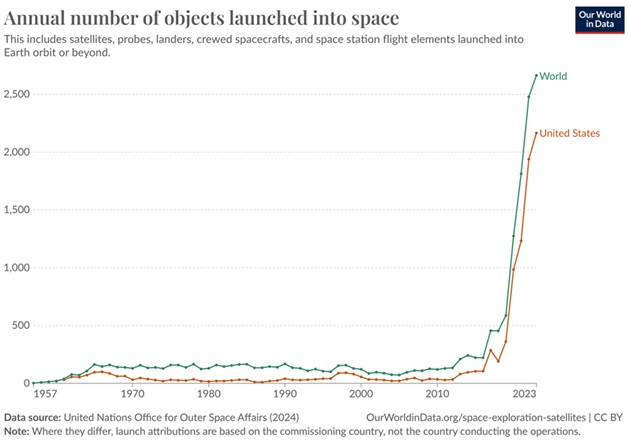Elon Musk’s SpaceX just broke another record.
It’s now the most valuable private company in the world, worth around $350 billion.
SpaceX is now bigger than Coca-Cola (KO), Wells Fargo (WFC), and Salesforce (CRM).
And I believe its value will grow to at least $1 trillion by 2030.
- SpaceX is single-handedly building the space economy.
Before SpaceX, sending cargo into orbit cost $5,000 per pound. SpaceX cut this down to around $600 per lb. And Payload Research estimates the new Starship rocket will slash the price to a mere $5 per lb. That’s less than how much you pay to fly a package from China to the US.
SpaceX changed the game by pioneering reusable rockets that land themselves after launch, ready for the next trip. Watching them land looks like something out of a sci-fi movie.
By slashing costs, SpaceX opened the space economy to everyone. There are now over 5,000 space startups in the US alone. And most of them rely on SpaceX to send their cargo to space.
SpaceX is essentially running a cosmic taxi. It launched 13 rockets in December alone. Booking a trip into orbit is almost as easy as preordering an Uber. You just visit SpaceX's website, type in the weight of your “parcel” and when you want to send it. You’ll get an instant quote.
Thanks to SpaceX, more objects reached space in the past two years than in all of previous history:

Source: Our World in Data
- SpaceX accounts for 95%+ of these launches...
It’s launching a rocket the size of a high-rise into orbit almost every other day. And it’s doing it with a near-perfect 99.7% success rate.
SpaceX raked in $8.7 billion in 2023. Payload Research estimated revenues were on pace to reach $13.3 billion in 2024.
A big chunk of SpaceX sales, around $6 billion, comes from its lucrative Starlink division. Starlink offers the first satellite internet fast enough to support streaming, online gaming, and video calling. It’s a go-to solution for cargo ships, airlines, and those living in remote areas. In the last year, Starlink subscribers doubled to 4 million.
Bottom line, SpaceX is a great business. I expect its revenues will reach $130 billion over the next decade as it pioneers a new space age.
If you want to invest in a dominator while the space industry is still in its early stages, now is a good time to do it.
- “But Stephen, SpaceX stock doesn’t trade on the stock market... how can I invest in it?”
You’re right. SpaceX is a private company.
But don’t worry, there are a couple ways to invest in it.
The most direct option is to buy SpaceX shares on pre-IPO marketplaces.
In the early days, startups are strapped for cash. Most of the money is spent on expanding the business and there’s little left for employees. So startups will typically offer company shares as compensation.
Until recently, it was difficult for employees to sell those shares. In most cases, they would have to wait until the initial public offering.
But lately, a number of pre-IPO marketplaces popped up where early investors and employees can offload their shares. Some of the most popular ones are Hiive, Forge, EquityZen, and Nasdaq Private Market. You can find folks selling SpaceX shares on any of these four.
Buying on a pre-IPO marketplace is the most direct way to buy SpaceX shares before they become available to the general public.
The downside of these platforms is that the minimum investment can range from $10,000 to $50,000. They also charge you a 2–5% transaction fee.
- An easier, “backdoor” way to invest in SpaceX is to buy the Destiny Tech100 ETF (DXYZ).
This ETF invests in the top pre-IPO tech companies.
It includes companies like OpenAI, Discord, Revolut, Epic Games, and so on.
But its largest holding by far is SpaceX. It takes up 37% of the entire portfolio.
The ETF also includes two other space companies—Axiom Space and Relativity Space—which make up 8.5% of the portfolio.
I first recommended the DXYZ ETF to my Jolt subscribers back in August. It’s surged around 490% since.
You can buy the Destiny Tech100 ETF through most brokerage accounts. An added benefit is that it trades at just $57 per share, so it doesn’t require a large upfront investment.
The downside is that this is a closed-end fund. Meaning it can trade above or below the actual value of companies inside it. And it comes with a high 2.5% yearly management fee.
Consider taking a stab… but put this in the “fun money trade” bucket. A cool opportunity, but don’t throw more than 100 bucks into it.
For more ideas like this, consider joining my Jolt investing letter. It’s free, and I write about disruptive technologies and how to invest in them. My mission is to show you where the opportunities are, and there are a lot of important disruptive tech trends as we kick off 2025.
Go here to join The Jolt—where innovation meets investing.
_______________
Stephen McBride is Chief Analyst, RiskHedge. To get more ideas like this sent straight to your inbox every Monday and Friday, make sure to sign up for The Jolt, a free investment letter focused on profiting from disruption.
© 2026 Newsmax Finance. All rights reserved.